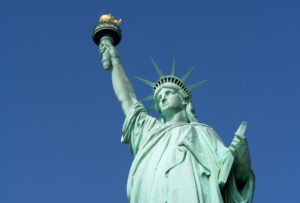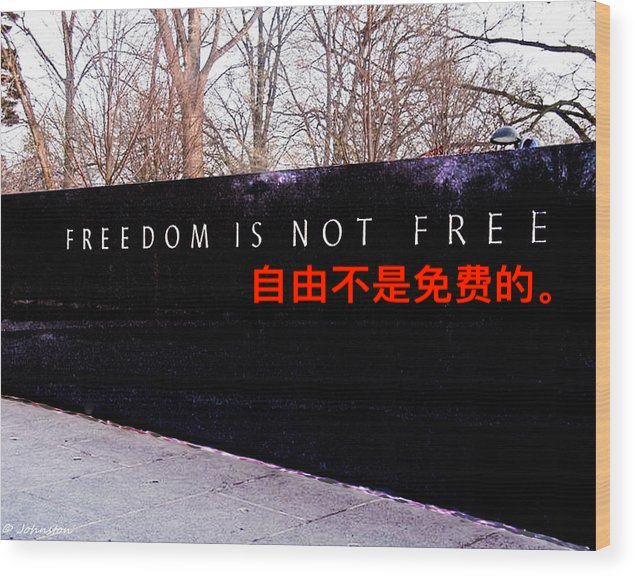作者:陈奎德
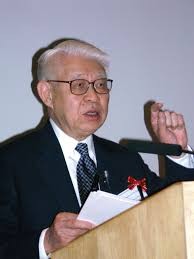
林毓生教授
回首当年 学人风采
当2022年11月传来林毓生先生辞世噩耗时,震骇之余,笔者陷入了一段长时间的麻木,挥之不去。这几年,太多的师长朋辈突然故去,尤其是2021年余英时先生,紧接着2022年林毓生先生和张灏先生,这三位近四十年来我常常请益的师长相继离世,如醍醐灌顶,把我灌下冰窟,头脑一片空白。这个世界怎么滑向末日了?万语千言,不知从何说起……?
今天,离林先生过世已近三年,麻木之后,痛定思痛,林先生与笔者个人之间的往事点点滴滴,涌上脑海,是该写点东西了。
那是1988年夏天,美国威斯康星大学林毓生教授在上海访问讲学,来到笔者主持的文化研究所(属于华东理工大学,当时名华东化工学院)接受作为文化研究所荣誉教授的聘书,并作了关于现代自由主义的讲座。
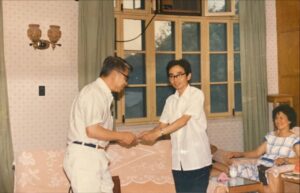
图为1988年林毓生先生(左)接受华东理工大学文化研究所荣誉教授聘书,右坐者为林教授夫人宋祖锦女士

1988年林毓生先生在文化研究所做有关现代自由主义讲座
年纪稍长的人还记得,八十年代后半期,林毓生在中国知识界已经以嘹亮的自由主义号角知名。当年我已读过林教授的诸多著述,特别是他与殷海光先生的通信以及对海耶克思想的论述。然私人的过从交往,还是从1988年开始。那是中国思想文化界热风吹雨的时节。出生沈阳的林先生,其人身材高大,目光炯炯有神,奔走于京沪之间,兼有北方人的豪爽风与南方人的书卷气。但与他聊天却并非轻松之事。他总是能从愉快的寒暄很快地转向沉重而艰涩的学术及历史话题。林先生不是那种口似悬河滔滔不绝的演说家,而是字斟句酌,一句三停,不时界定概念,谨慎挑选妥当词句的学者。他深恐有丝毫不确而导人入歧路。林先生在笔者主编的《思想家》上发表文章(见下面附图),都要亲自反复校对,并郑重叮嘱希望不要更改。这种一丝不苟的作派,典型地体现了他那句关于学术研究要“比慢”的令人略感诧异的著名表述。

林毓生教授发表在笔者主编的《思想家》杂志上的文章(1989年1月上海出版)
林教授早年与张灏教授同是台湾大学哲学系殷海光先生的“殷门弟子”。如所周知,所谓“殷门弟子”,是台湾自由中国运动中的一股年轻的中坚力量,在殷海光先生的精神感召下,成为推动台湾社会转型的学界翘楚。 1960年代林毓生赴美在芝加哥大学师从政治哲学家与经济学家弗里德里希.·海耶克(Friedrich August von Hayek)、社会学家爱德华·希尔斯(Edward Albert Shils)深造,从此成为·海耶克的亲炙弟子,并终生服膺其自由主义思想体系。自获得博士学位后林先生在威斯康星大学麦迪逊分校任教,1994年获选中华民国中央研究院院士,2004年成为威斯康星大学历史学系荣誉教授。
林毓生先生最显著的特点,以及他一生孜孜不舍的志业,就是以一种传教士式的热忱,深研并传播海耶克在现代重新启动的古典自由主义理念。该理念在政治思想上可溯源自苏格兰启蒙运动 {亚当. 斯密(Adam Smith)、休谟 (David Hume)、佛格森 (Adam Ferguson) 为代表} ,在经济学上则是溯源于孟格(Carl Menger)及维舍(Friedrich Von Wieser)、庞- 巴卫克(Eugen von Bohm-Bawerk)与米塞斯(Ludwig von Mises) 为代表的奥地利学派。
这一脉中间偏右的自由主义思潮(即带有某种保守主义倾向的自由主义),在1980年代后期以及1992—2013年在非官方的中国知识界话语中,实际上已经占据了主流地位(如徐友渔、朱学勤、刘军宁、周其仁、张维迎、高全喜、贺卫方、张鸣、吴稼祥…..等学者)。因此,在2013年之后,遭受到北京当局相当严酷的镇压,在中国大陆已经很难发声了。 在此期间,林毓生先生与中国大陆及台湾知识界的交流主要是在美国西方以及台湾香港等地进行的。但林毓生先前在上世纪八十、九十年代的论著及其演说,无疑对中国这种主流的自由主义思潮的兴起与扩展有启迪功能。这种影响,据林先生自述,与1975年他同余英时先生的会面有某种关联。
在台湾与大陆播撒自由主义种子
1975年,当林毓生教授在美国学界如鱼得水并逐渐形成一些自己的系统看法后,在台湾他见到了余英时先生。余先生与他谈及旅美的华裔人文学者应该拨出时间用中文撰文的重要性,林先生深以为然,颇有共鸣。林先生说:“就这样,我开始在1975年用中文撰文。”这是林先生后来成为穿梭于台海两岸成为自由主义传道士的重要缘起。
于是,林先生积极把自己的传教士式的热忱付诸实践,人们看到了他自从1975年之后在台海两岸的匆匆学术之旅。
先是,在暑期返回台湾,在台湾大学历史系讲授「思想史方法论」等一系列学术活动。
随后,在八十年代及九十年代后期二零一零年代几次进出中国特别是北京上海,传播海耶克式自由主义火种。这才有了如前所述于1988年应聘任华东理工学院文化研究所荣誉教授以及后来于2002年被聘为中国美术学院名誉教授之举。林先生并在中国多个学术单位举办演讲、讲座,在多种刊物报纸上发表论文或各类文章,譬如前述1989年1月在《思想家》杂志创刊号的《胡适与梁漱溟关于东西文化及其哲学的论辩及其历史意义》等论文与文章的发表。
1989年天安门事件之后有一段时期,林教授很难再赴中国大陆展开学术活动,但他与海外中国学者作家的交往却更加频繁了,特别是我所了解的与普林斯顿中国学社的流亡知识人的交流。
1991年5月3、4、5日林教授参加在普林斯顿大学举办的《从五四到河殇》的大型学术研讨会,就“西方自由主义对马克思主义的批评”为题作了长篇学术发言。指出,马克思主义的根本基本错误前提在于,它企图摧毁过去的文明成果,从零开始以理性设计一整套完美无缺的文明,依恃暴力革命凭空在人间创造一个天堂,结果却是把世界带回野蛮,造成了历史上亘古未有的人类灾难。
1995年5月林毓生来普林斯顿中国学社参加《文化中国:转型期思潮及流派》学术研讨会。在会议上,他以充分理据批评了与会几位新左派学者崔之元、甘阳和王绍光的主张,指出他们所谓“超越社会主义/资本主义两分法“的所谓”制度创新”势必导致复辟到暴力革命确立的共产极权制度。
…………
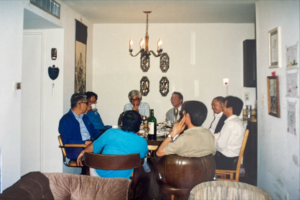
1995年5月林毓生来普林斯顿中国学社参加《文化中国:转型期思潮及流派》学术研讨会期间在笔者家晚餐(左起顺时针:林毓生 李泽厚 傅伟勋 金春峰 阮铭 陈奎德 商戈令 苏晓康)
学术与思想贡献
林毓生先生用他独有的清晰、干净、有分寸,用『奥卡姆的剃刀(Ockham’s razor)』,删削掉无关的论述及词句,不卖弄术语,杜绝陈腐之词和文艺腔调的行文,成就了他的学术风格。林先生的学术与思想贡献,除了他在海峡两岸严谨而深入地阐释海耶克式的自由主义思想精髓,如自由与解放、自由与权威、法治与法制、人权与民权、宪政与极权、法律的普遍性与抽象性、三种不同的「民主」之区分等重要概念的厘清,澄清了多年来弥漫中国学界的迷雾之外,更重要的是他自己的原创性贡献。在笔者看来,主要是如下两点:
1.「全盘性反传统主义」(Totalistic anti-traditionalism or totalistic iconoclasm)
林先生认为,相较于世界史上的思想运动,20 世纪中国思想史最显著的特征之一,是源起于中国五四时代对于中国传统文化遗产坚决地全盘否定的态度。五四时期全盘化的反传统主义(又称整体主义的反传统主义,totalistic anti-traditionalism),意指「对中国传统复杂、丰富的内容,不作分辨,直指中国传统的整体」。其中,传统儒家思想尤其被认为与中国传统的其他部分有「必然」的「有机式因果关系」,若要进行中国社会与政治的变革,首先必须彻底改变人们思想和价值,以进一步根除仍盛行于当时的旧传统。这一以儒家思想为中心目标而对中国传统整体性攻击,林毓生描述为「思想决定论的化约主义」,呈现「意识形态」的特征──意味着持全盘化的反传统主义立场的中国知识分子,根据自己的前提,发展出一套封闭性强的「系统性」论述,并以此为基础,自认不需要对传统的所有成分加以研究,也无须分梳取舍传统的不同部分,而直接对传统采取以思想为中心、整体性地摒弃。
要 解 释「全盘性反传统主义」之出现,必须从中国传统文化找内因:由传统一脉相
承到现代中国知识人的心灵,有一种根深柢固的文化倾向——「借思想、文化以解决问题的方法」(cultural-intellectualistic approach),这是一种简单化、一元论的思想方法,其根本信念是预设思想、观念以至文化的改变是一切变革的根本,将思想与行动之间的关系视为密切的、甚至是同一的关系。它有潜在演变成「惟思想的、整体主义的思想模式」(intellectualistic-holistic mode of thinking)的可能性,即是将社会文化视为一个受思想主导影响的有机整体 。林教授认为,尽管五四时期的反传统主义者在思想内容上反对传统,但其思想模式仍受到传统的支配。这种把反传统归咎于传统的论点当年极具震撼性。
2.「文化传统的创造性转化」(creative transformation)
「创造性转化」一词,在现代台湾与中国大陆曾激起热烈讨论,其源自林毓生探讨五四时期整体反传统的「中国意识的危机」而起。林教授自己在《思想与人物一书中曾解释说:“这几年,偶尔看到国内有人引用,在一份有关[文化复兴]半官式文告中也曾出现(事实上,我说的『创造性的改进』或「创造的转化」必须与[文化复兴]之所指,做一严格的区分。)这几个字大有变成口号的危险了。但,究竟什么是文化传统的「创造性转化」呢?那是把一些中国文化传统中的符号与价值系统加以改造,使经过改造的符号与价值系统变成有利于变迁的种子,同时在变迁的过程中继续保持文化的认同。这是无比艰苦而长远的工作;不是任何一个人、一群人或一个时代的人所能达成的。 ……可惜的是,自五四以来,因为知识界的领袖人物,「多会呼叫,少能思想」,他们的学养与思想的根基太单薄,再加上左右政治势力的分化与牵制,所以「中国的学术文化思想,总是在复古、反古、西化、反西化或拼盘式的折衷这一泥沼里打滚,展不开新的视野,拓不出新的境界」。 ”
由于林毓生与五四之父与子胡适、殷海光皆有密切关系,以自由主义者自诩,因此「创造性转化」对于五四自由主义的深化探讨有实质性的贡献,也充满了知识人的现实关怀。然而,林毓生对于五四激进的各式思想,包括当年的自由主义有着强烈的批判,但又要从有限的历史资源中,寻求解决历史与现实纠结的问题。 「创造性转化」无疑是其提供的主要药方之一。是耶非耶,能否有效?尚待历史之验证。但无论如何,从它的巨大反响观之,林先生无疑深化了有关中国自由主义的讨论,这本身已经是创造性的成果了。
{注:以上概述,出自林毓生着《中国意识的危机》Lin Yü-sheng, The Crisis of Chinese Consciousness: Radical Anti-traditionalism in the May Fourth Era (Madison: University of Wisconsin Press, 1979) 和《思想与人物》(台北,1983;2009年东亚出版人会议选为“东亚经典100本”之一) 以及《二十世纪中国激进化反传统思潮、中式马列主义与毛泽东的乌托邦主义》}
林毓生先生致力批评的「全盘性反传统主义」和强烈主张的「文化传统的创造性转化」这两项原创性的学术思想贡献,引发了广泛的反响和赞誉,当然也激发了强烈的商榷和批评。有鉴于此,林先生的的这些思想学术创获无疑将留在二十世纪中国自由主义思想史上。
林毓生先生留下的学术遗产,计有:The Crisis of Chinese Consciousness: Radical Anti-traditionalism in the May Fourth Era(Madison,1979),中译本《中国意识的危机》(贵州,1986;修订再版1988)、《思想与人物》(台北,1983;2009年东亚出版人会议选为“东亚经典100本”之一)、《政治秩序与多元社会》(台北,1989)、《热烈与冷静》(上海,1998)、《殷海光 林毓生书信录》(合着)重校增补本(吉林,2009)、《中国传统的创造性转化》、《林毓生思想文选》(上海,2011年)、《中国激进思潮的起源与后果》(吉林,2012年)、《现代知识贵族的精神:林毓生思想近作选》等。
2022年11月22日,林毓生先生在美国丹佛市离我们而去了。他一生风尘仆仆,穿行于台湾、美国和中国大陆三地,孜孜以求自由法治人权宪政在东亚那一片古老的土地上生根发芽,开花结果。林先生殚精竭虑,以赤子之心,放言神州,洪钟大吕,掷地有声,成为回响在台海两岸的自由钟声。他的一生行止,令我想起了其先师殷海光对林毓生业师海耶克的评价:一开局就不同凡响:气象笼罩着这个自由世.界的存亡,思域概括着整个自由制度的经纬。如今,一个甲子过去,一个笼罩自由制度存亡的崭新局面之曙光正在远东的天边若隐若现。我想,林先生一定比我们更加洞悉先兆的,他可以在九泉之下安息。
The Resonance of the Bell of Freedom Across the Taiwan Strait
— In Memory of Professor Yusheng Lin
By Kuide Chen Ph.D.
Looking Back at the Scholar’s Grace
When the grievous news of Professor Yusheng Lin’s passing came in November 2022, I was stunned and subsequently sank into a prolonged numbness that I could not shake off. In recent years, too many of my teachers and peers have suddenly passed away. In particular, in 2021 Professor Yingshi Yu, followed closely in 2022 by Professors Yusheng Lin and Hao Zhang—three mentors from whom I had sought advice for nearly four decades— all departed one after another. It felt as if a cold bucket of ice water had been poured over me, leaving my mind utterly blank. Was the world sliding toward its end? With countless words on my mind, where could I even begin…? Now, nearly three years after Professor Lin’s passing, as the numbness has given way to reflection, memories of the many moments between him and myself have surged back. It is time to write something down.
It was the summer of 1988. Professor Yusheng Lin of the University of Wisconsin visited Shanghai and came to the Institute of Cultural Studies, which I directed (then under East China University of Chemical Technology, today’s East China University of Science and Technology). There, he accepted an appointment as Honorary Professor of the Institute and gave a lecture on modern liberalism.
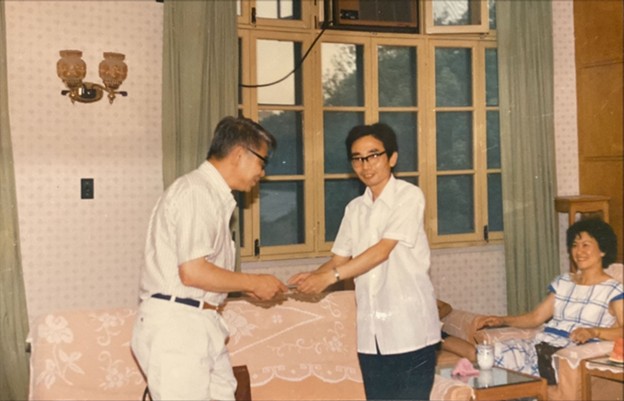

Those of slightly older generations may remember that, in the latter half of the 1980s, Yusheng Lin had already become widely known in Chinese intellectual circles as a resounding voice for liberalism. By then, I had already read many of his writings, especially his correspondence with Professor Haiguang Yin and his discussions on Friedrich Hayek’s thought. Yet our personal acquaintance began only in 1988, during those stormy and fervent years in China’s intellectual and cultural scene. Born in Shenyang, Professor Lin was tall and imposing, with piercing eyes. Moving between Beijing and Shanghai, he combined the forthrightness of a Northerner with the literary refinement of a Southerner. But chatting with him was by no means light or casual. He could shift quickly from cheerful greetings to weighty and abstruse topics in scholarship and history. He was not a fast-talking orator with a glib tongue, but a scholar who chose words with great care, weighing every sentence, constantly defining concepts and cautiously selecting precise terms. He feared that even the slightest imprecision might mislead others down the wrong path. Whenever he published in Thinker—a journal I edited (see illustration below)—he would personally proofread the articles repeatedly and solemnly requested that no changes be made. This meticulous approach embodied his well-known and somewhat surprising dictum about scholarship: that it must “err on the side of slowness.”
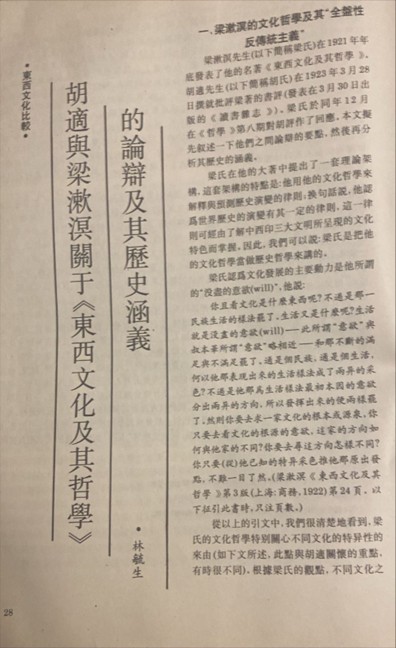
Professor Lin, together with Professor Hao Zhang, had been a disciple of Professor Haiguang Yin at The Department of Philosophy, National Taiwan University. As is well known, the so-called “disciples of Yin” formed a vigorous young force in Taiwan’s Free China movement, who, inspired by Professor Yin’s spirit, became leading figures in steering Taiwan’s social transformation. In the 1960s, Lin went to the United States and studied at the University of Chicago under political philosopher and economist Friedrich August von Hayek and sociologist Edward Albert Shils. From that point, he became a close disciple of Hayek and a lifelong adherent to his system of liberal thought. After earning his doctorate, Lin taught at the University of Wisconsin–Madison. In 1994, he was elected an Academician of Academia Sinica, and in 2004, he became Professor Emeritus in the Department of History at the University of Wisconsin.
The most remarkable trait of Professor Lin, and the life mission he pursued tirelessly, was his almost missionary zeal in studying and disseminating Hayek’s revival of classical liberalism in modern times. This intellectual lineage, in political thought, can be traced back to the Scottish Enlightenment (represented by Adam Smith, David Hume, and Adam Ferguson), and in economics, to the Austrian School (Carl Menger, Friedrich von Wieser, Eugen von Böhm-Bawerk, and Ludwig von Mises).
This center-right strain of liberalism—liberalism with a certain conservative inclination—had by the late 1980s and especially between 1992 and 2013 become the mainstream discourse in China’s unofficial intellectual circles (with scholars such as Youyu Xu, Xueqin Zhu, Junning Liu, Qiren Zhou, Weiying Zhang, Quanxi Gao, Weifang He, Ming Zhang, Jiaxiang Wu, among others). Consequently, after 2013 it faced severe suppression by Beijing authorities, making it nearly impossible to be voiced on the mainland. During this period, Professor Lin’s exchanges with intellectual circles in mainland China and Taiwan primarily took place in the West, Taiwan, and Hong Kong. Nevertheless, his writings and speeches from the 1980s and 1990s undoubtedly helped inspire and nurture the rise and expansion of this mainstream liberal trend in China. According to Lin himself, this influence was in some way related to his meeting with Professor Yingshi Yu in 1975.
Sowing the Seeds of Liberalism in Taiwan and Mainland China
In 1975, after Professor Yusheng Lin had found his footing in American academia and gradually developed some of his own systematic views, he met Professor Yingshi Yu in Taiwan. Yu emphasized to him the importance of overseas Chinese scholars in the humanities setting aside time to write in Chinese. Lin agreed wholeheartedly and resonated deeply. He later recalled: “That is how I began writing in Chinese in 1975.” This became the starting point for Lin’s subsequent role as a messenger of liberalism, shuttling across the Taiwan Strait. Thus, Lin put his missionary zeal into practice, and people soon witnessed his tireless academic journeys across the Taiwan Strait after 1975.
First, he returned to Taiwan during summers, where he gave lectures at the Department of History, National Taiwan University, including courses on “Methodology of Intellectual History” and other academic activities.
Subsequently, during the 1980s, late 1990s, and 2010s, he made several visits to China—particularly Beijing and Shanghai—where he spread the sparks of Hayekian liberalism. This included, as mentioned earlier, his appointment in 1988 as Honorary Professor at the Institute of Cultural Studies of East China University of Chemical Technology, and later, in 2002, as Honorary Professor at the China Academy of Art. Professor Lin also delivered lectures and talks at multiple Chinese academic institutions and published papers and articles in various journals and newspapers. For instance, he published “The Debate between Shi Hu and Shuming Liang on Eastern and Western Cultures and Philosophies and Its Historical Significance” in the inaugural issue of Thinker in January 1989.
After the Tiananmen Incident in 1989, for a time it became difficult for Professor Lin to travel to mainland China for academic activities. However, his interactions with overseas Chinese scholars and writers became even more frequent, especially his exchanges with exiled intellectuals of the Princeton China Initiative, which I personally witnessed.
On May 3–5, 1991, Professor Lin participated in the large-scale academic conference From May Fourth to River Elegy held at Princeton University. There, he delivered a long academic speech on “The Critique of Marxism by Western Liberalism.” He pointed out that the fundamental and fatal flaw of Marxism lies in its attempt to destroy all past civilizational achievements and start anew by rationally designing a flawless civilization. It relies on violent revolution to conjure up a paradise on earth from nothing, but the actual result is a return to barbarism and the creation of an unprecedented human catastrophe in history.
In May 1995, Professor Yusheng Lin attended the academic conference Cultural China: Intellectual Trends and Schools of Thought in a Time of Transformation, hosted by the Princeton China Initiative. At the conference, he sharply and rigorously criticized the positions of several new-left scholars, including Zhiyuan Cui, Yang Gan, and Shaoguang Wang. He argued that their so-called “institutional innovations” designed to “transcend the dichotomy of socialism and capitalism” would inevitably lead back to the communist totalitarian system established through violent revolution.

Academic and Intellectual Contributions
Professor Yusheng Lin developed a unique scholarly style—clear, precise, and measured. Employing “Ockham’s razor” to cut away irrelevant arguments and superfluous words, he avoided pedantic jargon, shunned stale expressions, and rejected ornate literary tones. His academic and intellectual contributions extended beyond his rigorous and in-depth explications of the essence of Hayekian liberal thought across the Taiwan Strait. He clarified key concepts such as liberty and liberation, liberty and authority, rule of law and rule by law, human rights and civil rights, constitutionalism and totalitarianism, the universality and abstraction of law, and the distinctions between three different types of “democracy.” By doing so, he dispelled much of the confusion that had long clouded Chinese academia. Even more importantly, he made original contributions of his own. In my view, they can be summarized primarily in two respects:
1,“Totalistic Anti-Traditionalism” (or Totalistic Iconoclasm)
Professor Yusheng Lin believed that, compared with intellectual movements in world history, one of the most striking features of twentieth-century Chinese intellectual history was the resolute and total denial of China’s traditional cultural heritage that emerged during the May Fourth era. The May Fourth period’s totalistic anti-traditionalism also called holistic anti-traditionalism—meant “directly targeting the entirety of Chinese tradition, without distinguishing among its rich and complex elements.” Traditional Confucian thought was especially seen as hav_ing an “inevitable” and “organically causal relationship” with other parts of Chinese tradition. Therefore, to transform Chinese society and politics, it was thought necessary first to thoroughly change people’s ideas and values, so as to eradicate the old traditions still prevalent at that time. This comprehensive attack on Chinese tradition, with Confucianism as its central target, was described by Lin as a form of “intellectual determinism reductionism,” bearing the features of an “ideology.” That is, Chinese intellectuals who adopted a totalistic anti-traditionalist stance developed, based on their own premises, a closed “systematic” discourse. On this basis, they believed they had no need to study the various components of tradition, nor to distinguish and select among its different parts, but could instead reject tradition as a whole in an ideologically comprehensive manner centered on ideas.
To explain the emergence of “totalistic anti-traditionalism,” one must seek internal causes within Chinese traditional culture. From tradition through to modern Chinese intellectuals’ minds, there had been a deeply rooted cultural tendency—what Lin called a “cultural-intellectualistic approach,” that is, a method of seeking solutions through ideas and culture. This is a simplified, monistic way of thinking, whose fundamental belief presupposes that changes in thought, ideas, and culture constitute the foundation of all transformation. It views the relationship between thought and action as close—even identical. This tendency contains the potential to evolve into what Lin termed an “intellectualistic-holistic mode of thinking,” which conceives of social culture as an organic whole directed and dominated by ideas. Professor Lin argued that, although the anti-traditionalists of the May Fourth era opposed tradition in terms of content, their mode of thought was still shaped by tradition. This argument— attributing anti-traditionalism itself to tradition—was profoundly shocking at the time.
2,“Creative Transformation” of Cultural Tradition
The concept of “creative transformation” once stirred intense debate in both modern Taiwan and mainland China. It originated from Yusheng Lin’s exploration of totalistic anti-traditionalism in The Crisis of Chinese Consciousness. In his book Intellectuals and the Chinese Cultural Tradition, Lin explained: “In recent years, I occasionally saw this phrase quoted domestically, and it even appeared in a semi-official proclamation about ‘cultural renaissance.’ (In fact, what I referred to as ‘creative improvement’ or ‘creative transformation’ must be strictly distinguished from what is meant by ‘cultural renaissance.’) These few words run the risk of turning into a mere slogan. But what, after all, is the ‘creative transformation’ of cultural tradition? It is to adapt certain symbols and value systems within Chinese cultural tradition, so that these adapted symbols and values become seeds conducive to change, while at the same time preserving cultural identity during the process of transformation. This is an arduous and long-term task; it cannot be achieved by any single individual, group, or even an entire era… Unfortunately, since the May Fourth era, because the leading figures of the intellectual world ‘are more inclined to shout slogans than to think,’ their scholarly cultivation and intellectual foundations have been too weak. Coupled with the divisions and constraints imposed by both the left and the right political forces, Chinese academic and cultural thought has always been stuck in the quagmire of revivalism, anti-traditionalism, Westernization, anti-Westernization, or eclectic patchwork, unable to open new horizons or expand into new realms.”
3,“Creative Transformation” of Cultural Tradition
The concept of “creative transformation” once stirred intense debate in both modern Taiwan and mainland China. It originated from Yusheng Lin’s exploration of totalistic anti-traditionalism in The Crisis of Chinese Consciousness. In his book Intellectuals and the Chinese Cultural Tradition, Lin explained: “In recent years, I occasionally saw this phrase quoted domestically, and it even appeared in a semi-official proclamation about ‘cultural renaissance.’ (In fact, what I referred to as ‘creative improvement’ or ‘creative transformation’ must be strictly distinguished from what is meant by ‘cultural renaissance.’) These few words run the risk of turning into a mere slogan. But what, after all, is the ‘creative transformation’ of cultural tradition? It is to adapt certain symbols and value systems within Chinese cultural tradition, so that these adapted symbols and values become seeds conducive to change, while at the same time preserving cultural identity during the process of transformation. This is an arduous and long-term task; it cannot be achieved by any single individual, group, or even an entire era… Unfortunately, since the May Fourth era, because the leading figures of the intellectual world ‘are more inclined to shout slogans than to think,’ their scholarly cultivation and intellectual foundations have been too weak. Coupled with the divisions and constraints imposed by both the left and the right political forces, Chinese academic and cultural thought has always been stuck in the quagmire of revivalism, anti-traditionalism, Westernization, antiWesternization, or eclectic patchwork, unable to open new horizons or expand into new realms.” ·
Because of Lin’s close intellectual relationships with Shi Hu, Haiguang Yin, and other figures—men who were regarded as fathers of the May Fourth Movement—and because of his own identity as a self-proclaimed liberal, the idea of “creative transformation” made a substantive contribution to the further exploration of May Fourth liberalism, while also embodying an intellectual’s deep concern for reality. Nevertheless, Yusheng Lin maintained strong critiques of the various radical ideologies of the May Fourth period, including even the liberalism of that era. At the same time, he sought ways to resolve the entanglement between history and reality within the limits of available historical resources. “Creative transformation” was undoubtedly one of the main remedies he proposed. Whether it is truly effective or not remains to be tested by history. But regardless, judging from its enormous impact, Professor Lin unquestionably deepened the discussion of Chinese liberalism—and that in itself was a creative achievement.
(Note: The above summary is drawn from Yusheng Lin’s works: The Crisis of Chinese Consciousness: Radical Anti-Traditionalism in the May Fourth Era (Madison: University of Wisconsin Press, 1979); Intellectuals and the Chinese Cultural Tradition (Taipei, 1983; se_lected in 2009 by the East Asian Publishers’ Conference as one of the “100 East Asian Classics”); and Twentieth-Century China’s Radical Anti-Traditionalist Trends, Sinicized Marxism, and Mao Zedong’s Utopianism. )
Professor Yusheng Lin’s devoted critiques of “totalistic anti-traditionalism” and his strong advocacy of “creative transformation of cultural tradition” stand as two original scholarly contributions that elicited widespread response and acclaim, while also provoking heated debate and criticism. In light of this, there is no doubt that these intellectual achievements will remain firmly inscribed in the history of twentieth-century Chinese liberal thought.
The scholarly legacy Professor Lin left behind includes: The Crisis of Chinese Consciousness: Radical Anti-Traditionalism in the May Fourth Era (Madison, 1979); its Chinese translation The Crisis of Chinese Consciousness (Guizhou, 1986; revised edition 1988); Intellectuals and the Chinese Cultural Tradition (Taipei, 1983; se_lected in 2009 by the East Asian Publishers’ Conference as one of the “100 East Asian Classics”); Political Order and Pluralistic Society (Taipei, 1989); Passion and Reason (Shanghai, 1998); The Correspondence of Haiguang Yin and Yusheng Lin (co-authored, revised and expanded edition, Jilin, 2009); Creative Transformation of Chinese Tradition; Se_lected Writings of Yusheng Lin (Shanghai, 2011); The Origins and Consequences of China’s Radical Ideological Currents (Jilin, 2012); and The Spirit of the Modern Intellectual Aristocracy: Se_lected Recent Writings of Yusheng Lin, among others.
On November 22, 2022, Professor Yusheng Lin passed away in Denver, Colorado. Throughout his life, he journeyed tirelessly between Taiwan, the United States, and mainland China, persistently striving for the rooting, blossoming, and fruition of freedom, the rule of law, human rights, and constitutionalism on that ancient land of East Asia. With tireless effort and a pure heart, he spoke out boldly across China. His voice was like a great bell of freedom, resonating powerfully across the Taiwan Strait. His life and work remind me of the words of his own teacher, Haiguang Yin, in his assessment of Lin’s mentor, Friedrich Hayek: “From the very outset, he was extraordinary. His vision encompassed the very survival of the free world; his intellectual domain summarized the warp and weft of the entire liberal order.” Now, sixty years later, a new dawn, one enveloping the survival of the liberal order, seems to be faintly emerging on the horizon of the Far East. I believe Professor Lin must have perceived this premonition far more clearly than we can. He may now rest peacefully beneath the Nine Springs.
